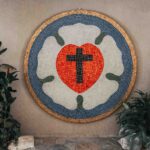This is also available in Danish.
A gospel coalition in northern Europe—the Nordic countries—is a unique effort in the landscape of Christendom in our region. The pragmatic efforts of intra-denominational groups (ie; the evangelical alliance in Denmark, or free church network) as well as the liberalizing ecumenical efforts of mainline churches contrast greatly with a Nordic recreation of The Gospel Coalition (TGC) in the US. This unified effort is distinct in our commitment to reformational gospel truths and by our theological vision for how the gospel can shape and reform our region of the world. This is the first of a series of five short articles devoted to naming and explicating this distinctiveness. Here are all the articles: 1, 2, 3, 4, and 5.
To the churches of Galatia: Grace to you and peace from God our Father and the Lord Jesus Christ, who gave himself for our sins to deliver us from the present evil age, according to the will of our God and Father, to whom be the glory forever and ever. Amen. (Gal. 1:3–5)
Nordic cooperation is making a comeback. When I was a teenager, it was popular for Swedes to speak English, both in Stockholm and abroad. When one encountered a Norwegian, it was natural to slip into the common language everyone had begun learning in grade school—English. Who wants to risk important misunderstandings anyway?
Nordic cooperation
But in 2023 with a threatening war in the doorsteps, Sweden is looking to Finland for military cooperation, and the north is understanding again the value of cooperative negotiation, immigration strategies and even communicating with one another’s native languages. These days, there are pan-Nordic councils for ethics, literature, environmentalism, gender equality, and integration (see www.norden.org). The darkness, isolation, and commitment to health and welfare bind our region together historically and culturally.
Of course, pockets of nationalistic backlash remain. Denmark is sometimes viewed as more interested in identifying with its southern neighbor Germany, with all its military and economic strength, than its Scandinavian neighbors. I have been told at times that Danes don’t like Swedes, and that Norwegians have a grudge against their history of Danish imperial occupation. It may be said that Iceland and the Faroe Islands, at times feel that their “island mentality” separates them from the fastidiousness of the other Nordic lands. But with these exceptions aside, it seems now more than in other times in history we understand that the north, “Norden” as is said in Swedish, Danish and Norwegian (languages also understood in much of Finland, Iceland, and the Faroe Islands)—can do more together than we can apart.
Paul wrote to a region
In the book of Galatians, Paul wrote to a region of churches that he had planted, including at least Antioch of Pisidia, Iconium, Lystra, and Derbe. In an early letter, which unpacked the most central gospel truths about justification and the new mission to the Gentiles, Paul chose not to write to a single church or city (as he often did otherwise) but to write to a region of churches. Why? We can only speculate as to why the Lord superintended this particular letter and its primary audience: perhaps Paul felt that the few gospel-believing Christians in each city were too isolated and needed to understand one another as a regional whole; perhaps the matters Paul addressed were so essential that he wanted them repeated again and again in the churches of the region; perhaps there were local conflicts that could be reconciled in the context of the wider gospel assembly. Whatever the reason we see God ordaining the churches of Galatia to be built up together within a broader regional fellowship.
A regional coalition for the gospel
As one example of this principle modeled by Paul, a Nordic regional gospel coalition would have something unique to offer. While the societies of the Nordics may look to one another to advance one political agenda or another or partner to become a richer and more competitive union, the churches within our fellowship together hold the gospel as our power and our light. Together, we remind another that all the human striving for health, wealth, and quality of life within our nations falls short of God’s glorious vision of goodness, which in fact reflects his own glory. God sent the very embodiment of the good life down to walk with us, to die in our place, and to be resurrected as a first fruit of the new life to come. As a coalition of gospel-centered churches, we can model and hold up this new life, this better way, which contrasts sharply with the undercurrents of stress, depression, and alcoholism plaguing our “happy countries.” Rather than partnering to build wealth, we can work together to boost one another up, encouraging and helping one another to daily catch glimpses of our glorious, all-satisfying God.









